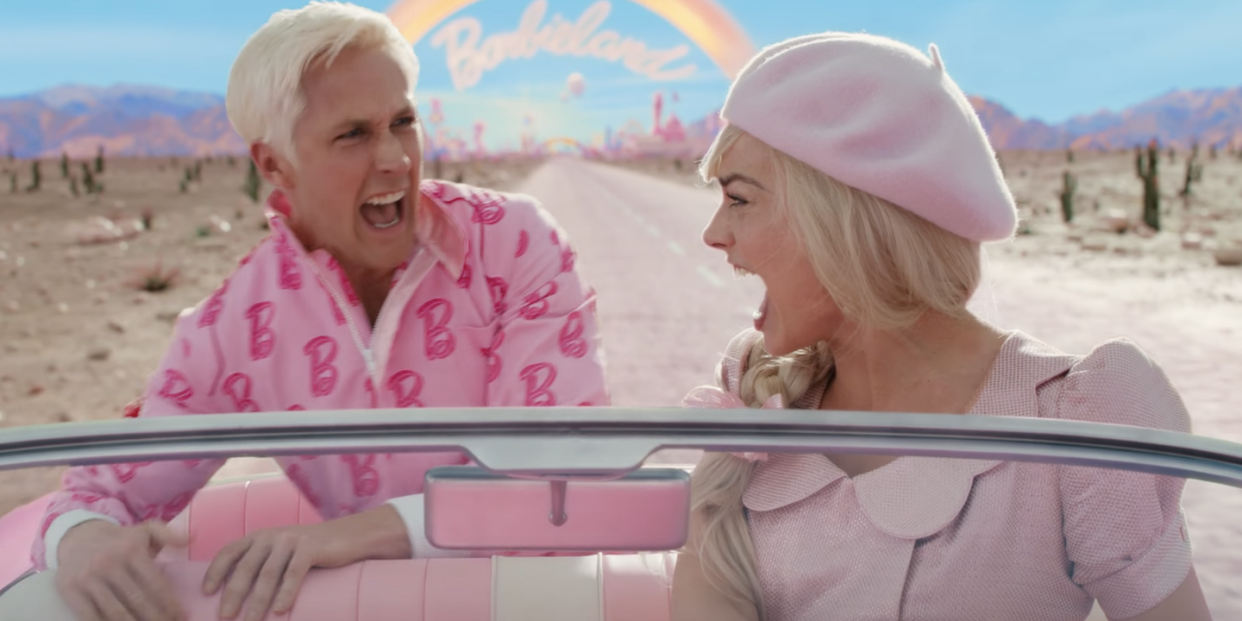Okay, We Need to Talk about the ‘Barbie’ Ending

- Oops!Something went wrong.Please try again later.
"Hearst Magazines and Yahoo may earn commission or revenue on some items through these links."
[There are spoilers ahead for the Barbie movie.]
The Barbie movie is many, many things (An absolute master class in costuming! A killer use of a soundtrack! Amazing performances!), but maybe the most important is that it is great conversation fodder. This movie, directed by Greta Gerwig and starring Margot Robbie and Ryan Gosling, has so many ideas, and it captures the very specific existential dread of being a woman, which is hard to do in a movie based on a doll. And the ending of the movie is a bit of of a gut-punch. So I'm here to talk it through, but it's worth noting that "explaining" the end of a movie is a bit of a weird task, considering it is up to anyone's own interpretation as a moviegoer! I digress. Here goes nothing.
What are the basic plot points of the Barbie ending?
Okay, so the Barbies trick the Kens into fighting with each other, and therefore they are able to take back Barbieland for themselves and reinstate their own constitution. It's a triumphant moment and truly a "girls rule, boys drool" situation. But in the midst of this, it looks like Stereotypical Barbie is not particularly excited. And Ken is distraught. Barbie and Ken have a moment where he grapples with his own identity, and Barbie reassures him that it's time for him to figure out who he is without her. They don't have to be Barbie and Ken. They can be Barbie, and they can be Ken, separately. He seems happy about this.
But Barbie is still wondering what her role is in this new Barbieland. She's seen the real world now, and she doesn't feel like she fits in here. The idea of a "normal Barbie" gets thrown around, but she's not really that either. Suddenly, the creator of Barbie, Ruth Handler, appears to give her another option. She and Barbie take a walk and she tells Barbie that she has the choice to feel and become a person if she wants. Barbie is confronted with the weight of being a real person with real feelings, and instead of choosing to go back to Barbieland, she becomes a human instead. The movie ends with her, hilariously, going to the gynecologist.
So, what does the Barbie ending really mean?
This is where it gets a little tricky because, again, it's up to you! But I'll tell you how I interpreted the movie, and then you can either say "she's right!" or "she's wrong!" and both of those takes are true.
The movie is throwing a lot at audiences in terms of takeaways, and I mean that as a compliment. But the movie is confronting the idea that women in society are set up to fail in so many ways. We are expected to be perfect, and obviously that is impossible. Barbie is literally the definition of a perfect person, until she's not. When reality creeps in, she panics, and encounters all these contradictions. At the end of the movie, when her universe has been set right on its axis, she has the choice to go back to being perfect Barbie or to be a human, with all the flaws and imperfections that come along with it. She chooses humanity and the full breadth of human emotion. It's like the movie is asking us: Okay, so even if you were perfect, would you want that? My guess is for most people the answer is no. You wouldn't. Because perfection flattens the human experience. Negative feelings are hard, but feeling nothing is far worse. Barbie's perfect existence ultimately leaves her feeling empty.
So basically, you might as well be whoever the heck you are when you are your truest self, because you will always be both right and wrong in someone's opinion. That's the only way you can escape the cycle of, "Am I being a woman, a person, in the right way?" Society expects people to be one thing, but there is no joy in conforming yourself to other people's version of who you should be.
So... I'm supposed to be filled with existential dread now?
No! If anything, the movie ends on the idea that you can choose your own path. Loving and accepting yourself are life-long processes. There's always time.
You Might Also Like

